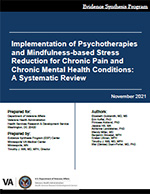
|
Prepared by: Recommended citation: |
Download PDF: Complete Report, Executive Summary, Report, Appendices
Studies of psychotherapies for chronic pain focused on patient-level barriers and facilitators; future work should explore heterogeneity of treatment effects, and provider and system-level factors. VA initiatives to implement psychotherapies for chronic pain and mental health conditions led to sustained effects on provider adoption of therapies. However, persistent barriers and facilitators limit uptake by patients. Tailored patient educational materials, evaluations of alternative delivery formats, and streamlining of referral processes may increase reach of psychotherapies.
Chronic pain is prevalent among Veterans and profoundly affects physical, mental, and social functioning. Psychotherapies are recommended by guidelines as first-line treatments for chronic pain, yet are underutilized clinically. To support the VA HSR&D Pain/Opioid Consortium of Research (CORE) in identifying research needs related to psychotherapy uptake, we conducted an evidence review on barriers, facilitators, and implementation strategies. We included psychotherapies for chronic mental health conditions, as results may apply to therapies for chronic pain.
A common barrier to uptake of cognitive behavioral therapy (CBT), mindfulness-based stress reduction (MBSR) and acceptance and commitment therapy (ACT) for chronic pain was a mismatch between patients' pain-related beliefs and perceptions of core therapy concepts. Other barriers to CBT included cultural, communication, and logistical factors, while facilitators included positive patient-therapist dynamics, patient readiness for change, and telehealth availability. Patient demographics did not consistently predict pain psychotherapy attendance. Shared barriers across psychotherapies for chronic mental health conditions included workload and scheduling challenges for providers; lack of educational resources and training for referring providers; transportation needs and competing responsibilities for patients; and variable patient buy-in to therapy rationale. Shared facilitators included leadership engagement; training and treatment delivery resources; communications and networks for continuing provider education; and positive patient-provider relationships. Evaluations of VHA national initiatives to implement psychotherapies have mostly not focused on patient factors affecting uptake and heterogeneity in treatment.
Systematic Review: Implementation of Psychotherapies and Mindfulness-based Stress Reduction for Chronic Pain and Chronic Mental Health Conditions (Management eBrief)
Goldsmith ES, Koffel E, Ackland PE, et al. Evaluation of Implementation Strategies for Cognitive Behavioral Therapy (CBT), Acceptance and Commitment Therapy (ACT), and Mindfulness-based Stress Reduction (MBSR): A Systematic Review. Journal of General Internal Medicine. 2023. DOI: https://doi.org/10.1007/s11606-023-08140-4.